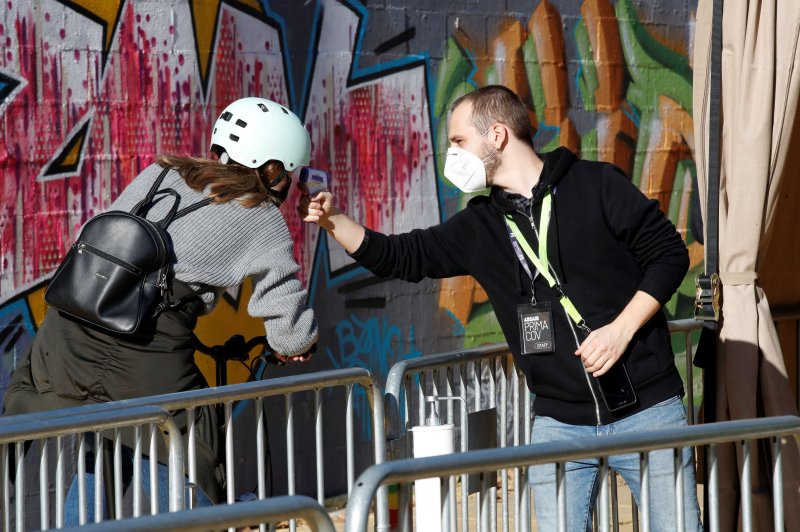A worker takes the temperature of a volunteer at the entrance of Sala Apolo ahead a concert on December 12 in Barcelona, Spain, as part of a study of coronavirus spread at indoor events. File Photo by Toni Albir/EPA-EFE
May 27 (UPI) -- When 465 people attended a concert at a 900-seat venue in Barcelona, Spain -- with open doors to circulate fresh air and everyone wearing an N95 face mask -- 13 people were carrying the coronavirus. But no one else at the concert got it.
In the experiment, whose results were published Thursday in the Lancet Infectious Diseases, people were allowed to sing and dance in close proxmity during the five-hour show.
"Our study provides early evidence that indoor music events can take place without raising the risk of transmission when comprehensive safety measures are in place," study co-author Dr. Josep Llibre said in a statement.
Prior to entry, all attendees were screened for the coronavirus using a test that produces results in 30 minutes. Once inside the Sala Apolo in Barcelona, Spain, they were required to wear N95 face masks.
The study "does not necessarily mean that all mass events are safe," said Llibre, a researcher in infectious diseases at Trias i Pujol University Hospital in Barcelona, but that safety precautions may make a difference.
At the time of the Dec. 12 concert, virus spread in city was low, at 221 cases per 100,000 population, and "many restrictions were in place," he said.
As a result, even though COVID-19 vaccines were not yet available locally, cases resulting from the event would have been expected to be low, according to Llibre and his colleagues.
In the United States, the Centers for Disease Control and Prevention continues to recommend against large gatherings, particularly those held indoors.
The CDC has relaxed its mask recommendations, indoors and outdoors, for those who are fully vaccinated against COVID-19.
In the Barcelona study, Llibre and his colleagues recruited people ages 18 to 59, excluding those who had tested positive for COVID-19 or been in contact with a positive case in the previous two weeks.
People with pre-existing health conditions that are known to increase the risk for severe COVID-19, as well as those living with older people, were also excluded.
Of the 1,000 participants, 465 were randomly assigned to attend the concert, where they stayed for two hours and 40 minutes, on average. The remaining 485 were sent home.
All participants tested negative for the virus prior to the concert, with rapid test results confirmed by a lab. The same samples were sent for a second, confirmation tests. When the second round of results came back days later, 13 tested positive.
In addition, all study participants, including those who did not attend the event, were tested for COVID-19 by a healthcare professional eight days after the event.
They were also required to install two smartphone apps -- a contact-tracing app to capture close contacts of people who may have become infected during the concert, and a separate one to access confidential test results.
Participants also used the second app to complete health questionnaires before and 10 days after the event.
In addition to testing, all attendees had their temperature monitored before being allowed entry to the concert, and they were given an N95 face mask, which had to be worn at all times inside the venue.
The venue was well-ventilated, with all doors remaining open throughout the concert to allow fresh air to circulate. The indoor temperature was controlled so that attendees could comfortably wear their masks, the researchers said.
None of the people who attended the event tested positive for COVID-19 eight days after the event, but there were two cases among the group that did not attend, the data showed.
The number of cases is low and in line with the epidemiological situation in Barcelona at the time of the study, the researchers said.
The findings show there was no increased coronavirus transmission associated with event attendance, and most attendees reported feeling able to behave normally despite the safety precautions.
When asked how willing they would be to attend another event with the same safety procedures, the average score was more than 9 out of 10, with 10 indicating most willing, the data showed.
"Mass gatherings are associated with a high risk of spreading the SARS-CoV-2 virus, and the cancellation of large events has played an important role in bringing the COVID-19 pandemic under control," study co-author Boris Revollo said in a statement.
However, given that "these cancellations have resulted in substantial economic losses," implementing proper safety precautions can "enable large events to take place," he said.















